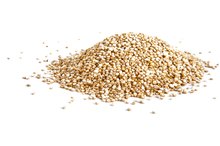What does fact checked mean?
At Healthfully, we strive to deliver objective content that is accurate and up-to-date. Our team periodically reviews articles in order to ensure content quality. The sources cited below consist of evidence from peer-reviewed journals, prominent medical organizations, academic associations, and government data.
The information contained on this site is for informational purposes only, and should not be used as a substitute for the advice of a professional health care provider. Please check with the appropriate physician regarding health questions and concerns. Although we strive to deliver accurate and up-to-date information, no guarantee to that effect is made.
Canned salmon is a good alternative when fresh salmon is not readily available because it is a source of high-quality protein and calcium. The United States Food and Drug Administration recommends that pregnant women and small children eat no more than two servings of canned salmon per week because of potential mercury contamination. One serving equals 3.5 oz. of canned salmon.
Amounts
Both pink salmon and red or sockeye salmon supply 23 g of protein per serving, according to the Alaska Seafood. If you consume a 2,000 calorie per day diet, you need about 60 g of protein, or 10 to 15 percent of your daily calorie intake. Eating one serving of salmon per day supplies 38 percent of your daily protein requirements.
Types
How Much Protein Is in a Filet of Flounder?
Learn More
Salmon contains 18 of the 20 amino acids that make up proteins, according to Alaska Protein Recovery 2. Of those, 10 are essential amino acids that your body can’t produce, so they must come from the foods you eat. Essential amino acids include:
- arginine
- which only infants need
- histidine
- isoleucine
- leucine
- lysine
- methionine
- phenylalanine
- threonine
- tryptophan,
- valine
Salmon contains all 10 essential amino acids as well as eight others.
Uses
Protein serves a number of purposes in the body, including acting as an energy source. Since protein, a complex molecule, takes longer to break down than carbohydrates, it supplies a longer-lasting source of energy. Protein repairs damaged tissue and builds new tissue.
- Protein serves a number of purposes in the body, including acting as an energy source.
- Since protein, a complex molecule, takes longer to break down than carbohydrates, it supplies a longer-lasting source of energy.
Benefits
Salmon & Skin Rash
Learn More
Fish such as salmon have several benefits over red meat as a dietary protein source. While meat contains saturated fats, which can raise cholesterol levels, salmon contains unsaturated omega-3 fatty acids, which reduce cholesterol levels and may benefit your heart. Eating more than 8 oz. of red meat per week may also increase your risk of developing colon cancer, the Harvard School of Public Health reports 4.
- Fish such as salmon have several benefits over red meat as a dietary protein source.
- While meat contains saturated fats, which can raise cholesterol levels, salmon contains unsaturated omega-3 fatty acids, which reduce cholesterol levels and may benefit your heart.
Related Articles
References
- University of Arizona: The Chemistry of Amino Acids
- Alaska Protein Recovery: Amino Acids
- Merck Manuals Online Medical Library: Overview of Nutrition
- Harvard School of Public Health: Protein
- Fish, salmon, Atlantic, wild, raw. FoodData Central. U.S. Department of Agriculture. Published April 1, 2019.
- Fish faceoff: Wild salmon vs. farmed salmon. Cleveland Clinic. Updated 2014.
- Graff IE, Øyen J, Kjellevold M, et al. Reduced bone resorption by intake of dietary vitamin D and K from tailor-made Atlantic salmon: A randomized intervention trial. Oncotarget. 2016;7(43):69200-69215. doi:10.18632/oncotarget.10171
- American Heart Association. Eating Fish for Heart Health. Updated March 27, 2017.
- Collins K. The best winter foods for kids. Academy of Nutrition and Dietetics. Updated 2018.
- Fish: Friend or foe?. Harvard T.H. Chan School of Public Health. Updated 2020.
- Thomas J, Thomas CJ, et al. Omega-3 fatty acids in early prevention of inflammatory neurodegenerative disease: A focus on Alzheimer's disease. Biomed Res Int. 2015;2015:172801. doi:10.1155/2015/172801
- Galasso C, Orefice I, Pellone P, et al. On the neuroprotective role of astaxanthin: New perspectives?. Mar Drugs. 2018;16(8). doi:10.3390/md16080247
- Fish allergy. American College of Allergy, Asthma & Immunology. Updated 2019.
- Crinnion WJ. The role of persistent organic pollutants in the worldwide epidemic of type 2 diabetes mellitus and the possible connection to Farmed Atlantic Salmon (Salmo salar). Altern Med Rev. 2011;16(4):301-313.
- Bergkvist C, Kippler M, Larsson SC, et al. Dietary exposure to polychlorinated biphenyls is associated with increased risk of stroke in women. J Intern Med. 2014;276(3):248-259. doi:10.1111/joim.12194
- Jeffery A. Foran, David H. Good, David O. Carpenter, M. Coreen Hamilton, Barbara A. Knuth, Steven J. Schwager, Quantitative analysis of the benefits and risks of consuming farmed and wild Salmon, The Journal of Nutrition, Volume 135, Issue 11, November 2005, Pages 2639–2643, doi: 10.1093/jn/135.11.2639
- Salmon recommendations. Monterey Bay Aquarium Seafood Watch.
- Selecting and storing fresh and frozen seafood safely. U.S. Food and Drug Administration.
Writer Bio
A registered nurse with more than 25 years of experience in oncology, labor/delivery, neonatal intensive care, infertility and ophthalmology, Sharon Perkins has also coauthored and edited numerous health books for the Wiley "Dummies" series. Perkins also has extensive experience working in home health with medically fragile pediatric patients.









